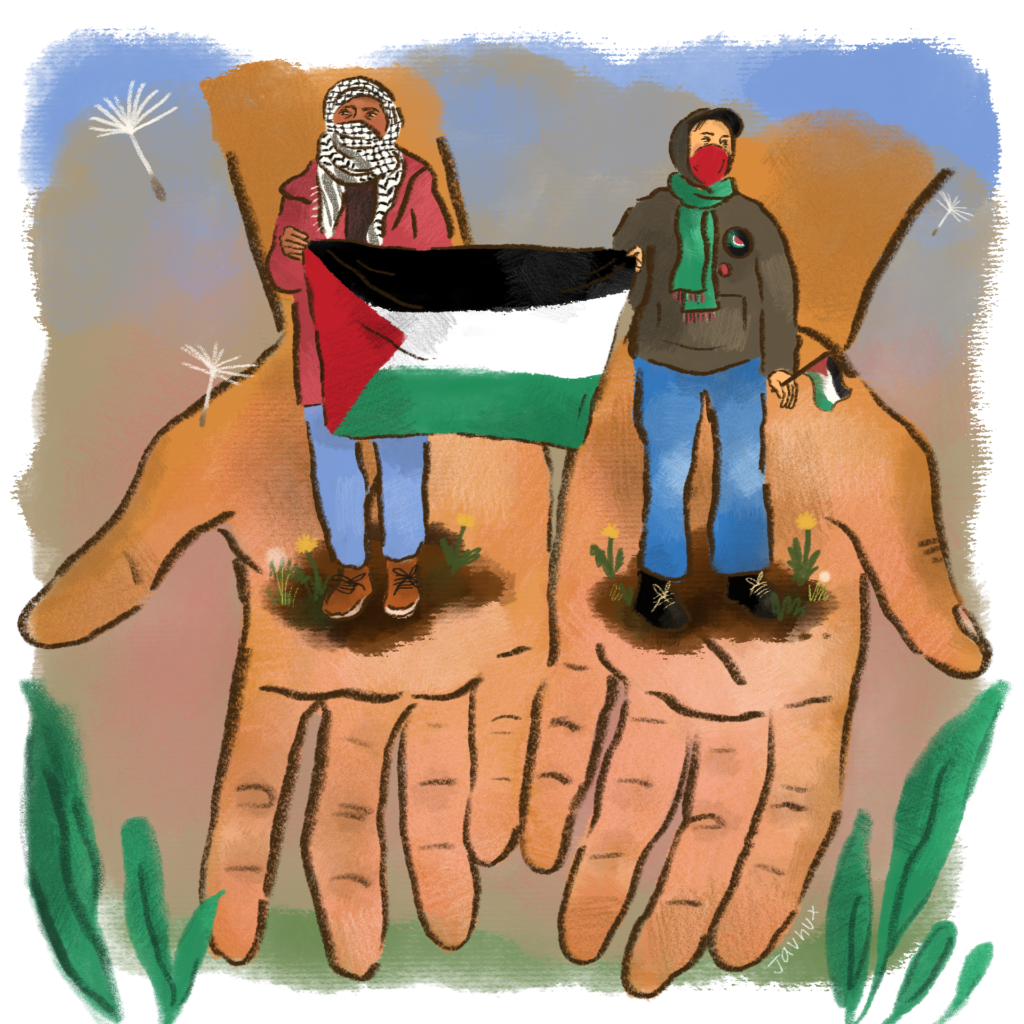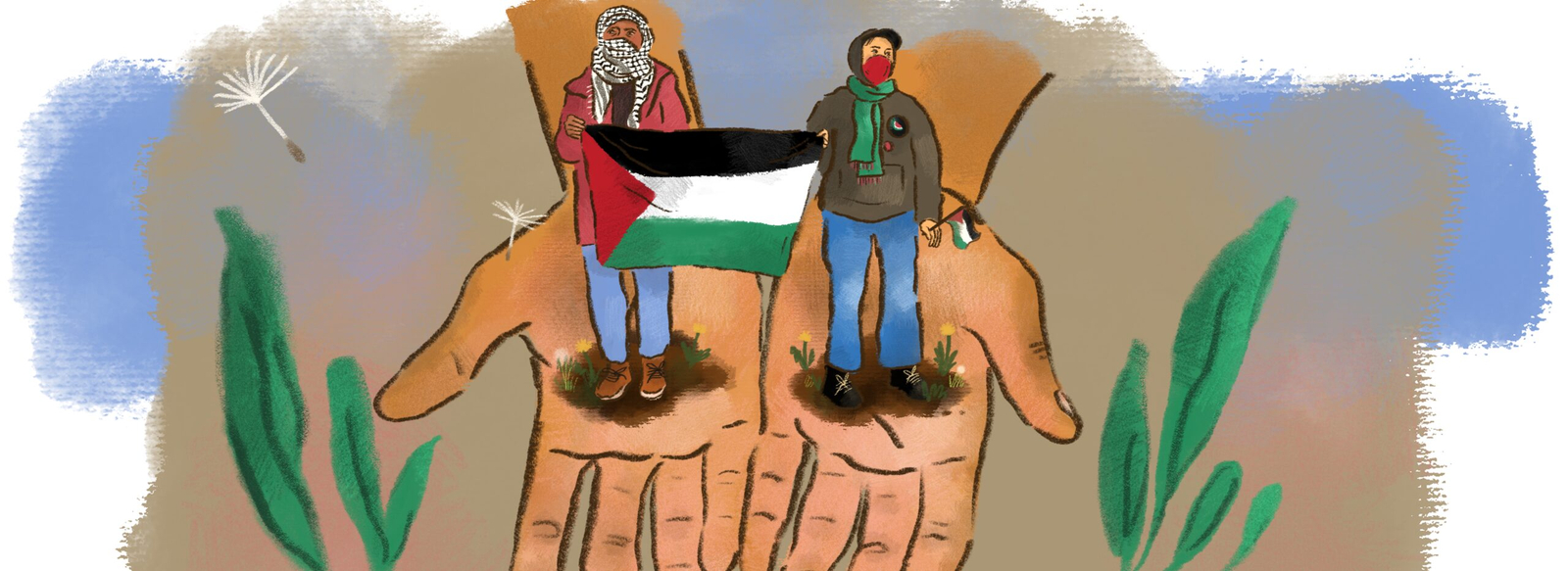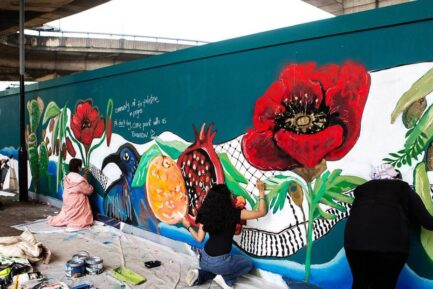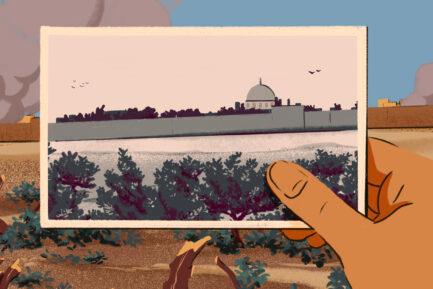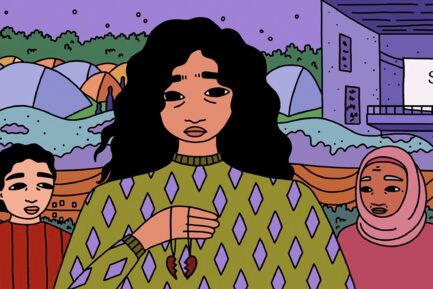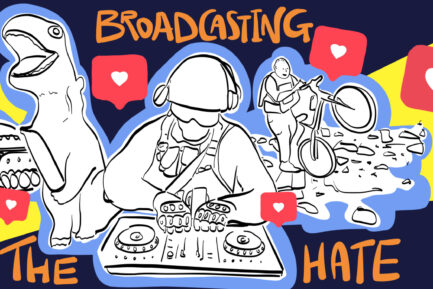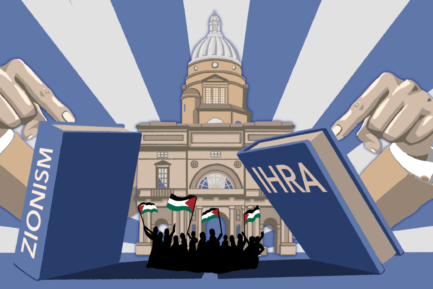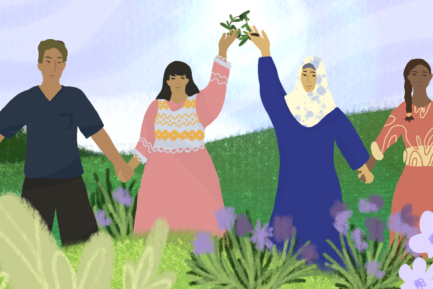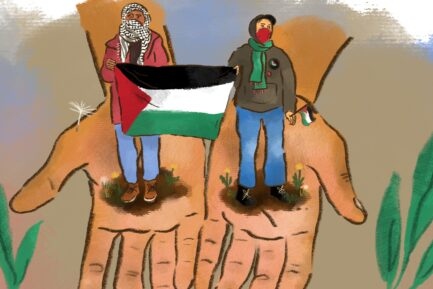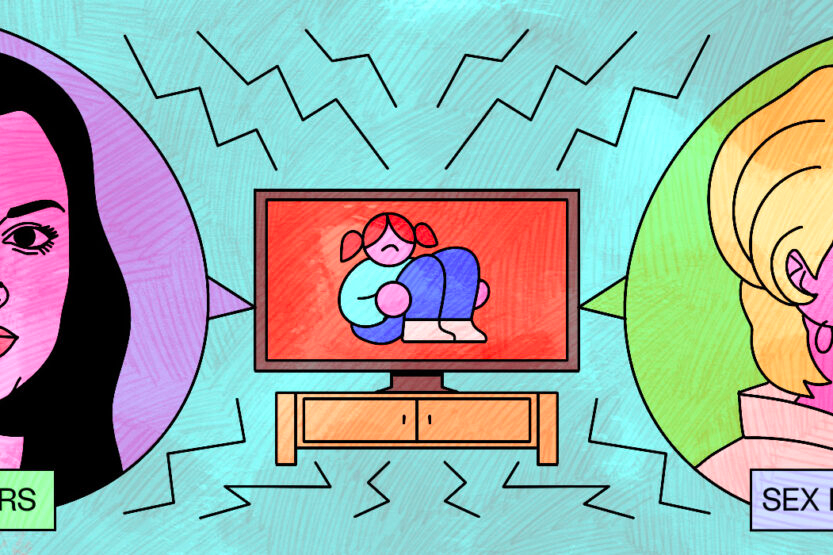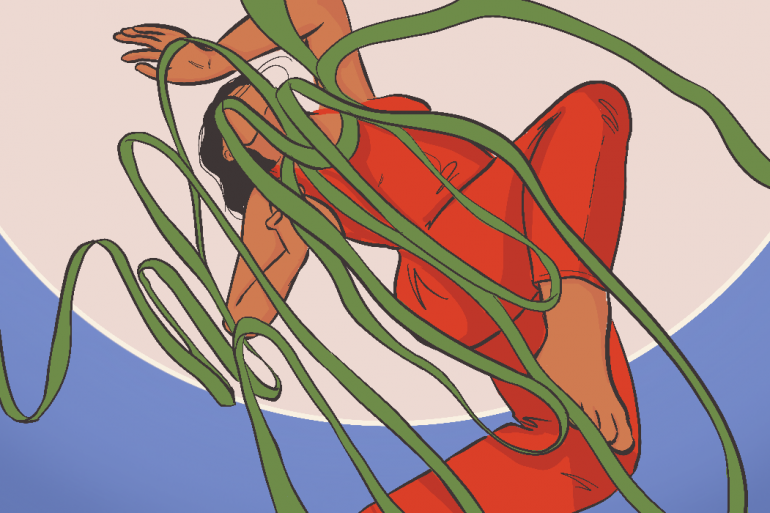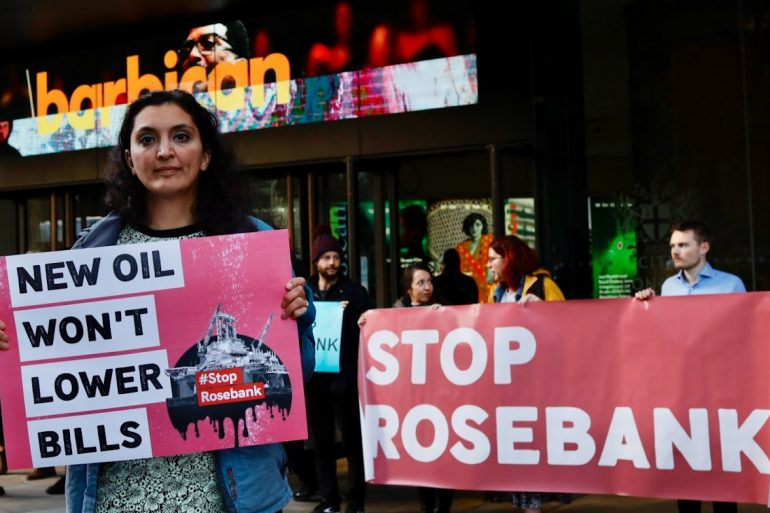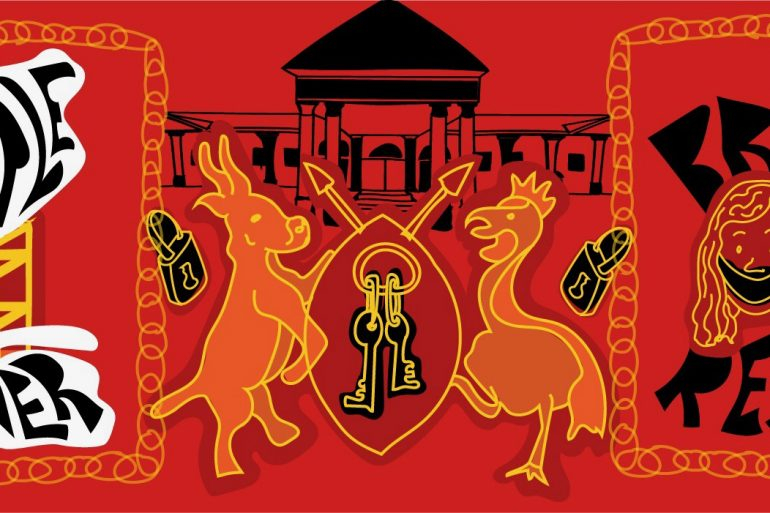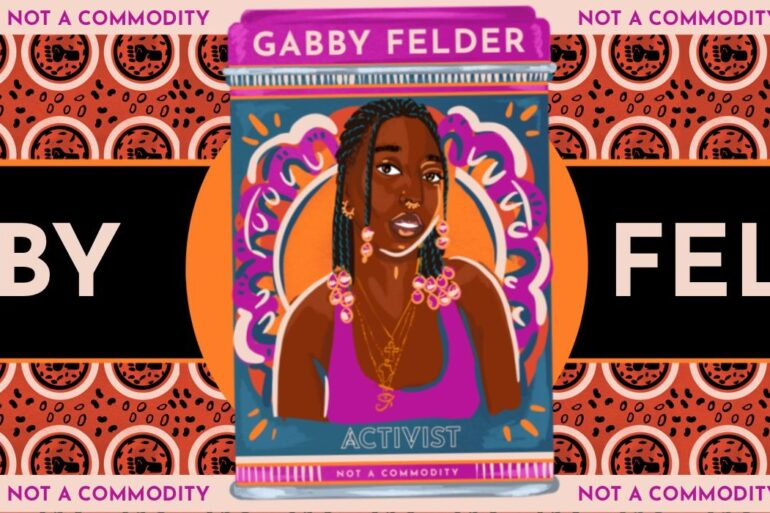Day 143 of genocide, and the whole spectrum of European solidarity with Palestine has been exposed. It ranges from those who’ve checked out, to others who – despite deep exhaustion – cannot think of anything else.
In January 2024 outside the ICJ (International Court of Justice), it was no different. Fewer than 800 people came to protest Israel’s case for their ongoing genocide of Palestine, and at least 200 of them had left by lunchtime. I was shocked. Whilst granted, the world’s highest court is steeped in imperialism and will not be Palestine’s ‘saviour’ – this specific case was lauded as a “historic” moment of solidarity. So why was barely anyone there?
I was not alone in my confusion. Stephanie, a decolonial queer activist and volunteer with a Brussels-based tea and coffee collective The Caddy, tells me that she also “found it really strange how people were just living their lives in the Hague” – in stark contrast to their Ghazzawi comrade, Omar Kream, who had travelled from Brussels to the ICJ on a 25 day hunger strike. I met them both between the screams and speeches outside the court; The Caddy was handing out fresh mint tea to cold protesters and Omar was chatting to comrades about his hunger strike.
When I asked Omar about the European solidarity movement for Palestine he admitted that “the struggle had not come to the level that it should have reached.” As he lamented, “our voices are not enough” – so he was instead compelled to go on hunger strike until the genocide stops. We exchanged disappointment about the low turnout and then Stephanie thoughtfully interjected with a truism that has stayed with me ever since: “white supremacy does really hold on to comfort though.”
It made me think: what are our limits when it comes to solidarity with Palestine? How far are we willing to go? And what does our unwillingness to relinquish comfort say about our politics of care for Palestine?
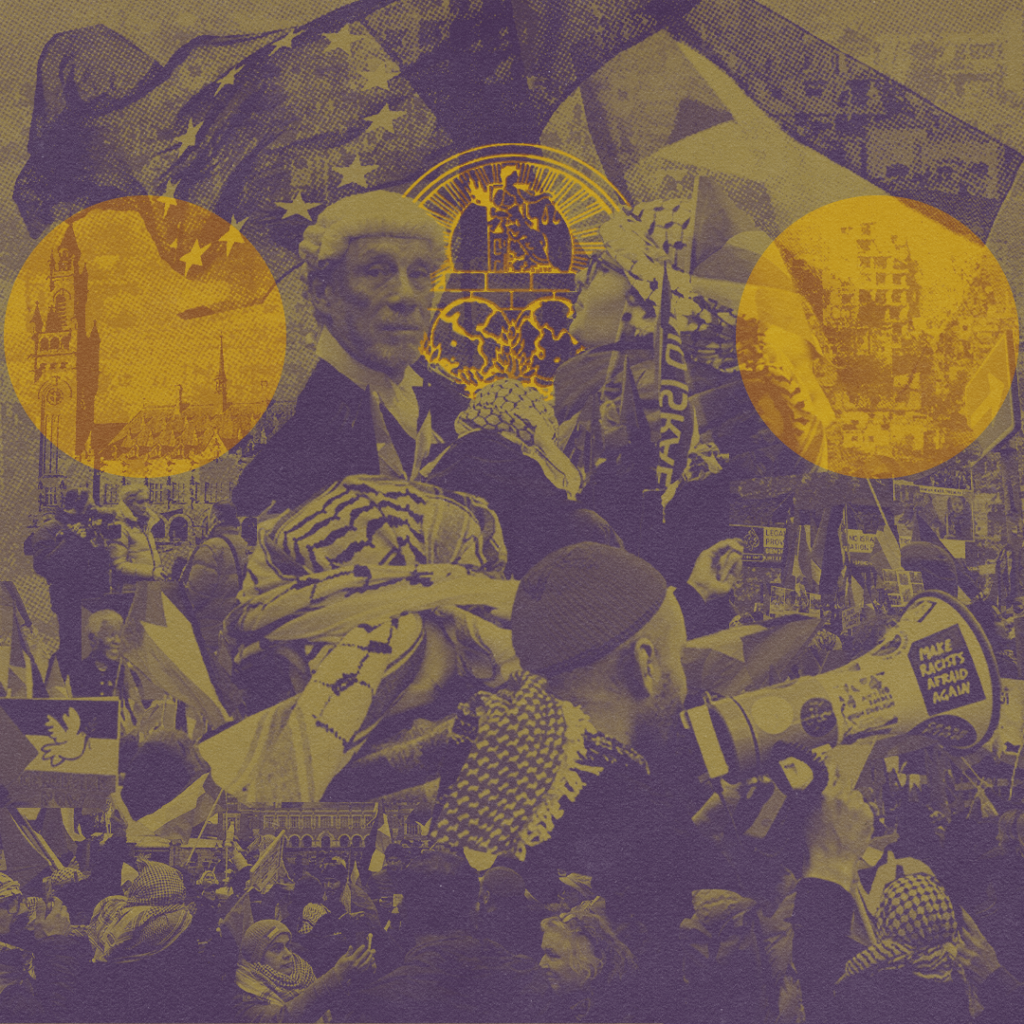
What is the ‘Politics of Care’?
Audre Lorde, during her fight with cancer, stated that caring for herself was “an act of political warfare.” This concept is a radical resistance against racial capitalism’s erasure and devaluation of care and care work, instead elevating the act of caring to being a critical tool in the arsenal of revolutionary struggle. It has since been co-opted, gentrified and reduced to ‘self-care Sundays’ with bubble baths and face masks – but social movements and radical scholars are reclaiming her vision through ‘the politics of care’.
The politics of care expands on Lorde’s work, understanding care as a political practice that works in and with community; fundamental to our social survival and political governance.
The Care Collective (a group of activist-scholars) view care as a means to transform our “careless world (and its) careless states” into “caring infrastructures and economies”. For abolitionists, it’s also a prefigurative practice that through experimentation can help us reshape our relationship to ourselves, each other and the world around us. Through care, we can reimagine and rehearse a radical abolitionist vision for our future, one that is grounded in transformative not punitive justice.
But to me, the unanswered question remains: what is the politics of care on a practical level?
This has been long discussed in social movements and I have experienced many activist iterations: wellbeing coordinators handing out snacks, water and emotional support, care meetings with group meditations and poetry or arrestee support that drives activists home post arrest.
Whilst different expressions, each example follows a similar pattern: an ‘add-on’ practice to our politics that embodies a kind and caring disposition. I want to complicate and confront this, to instead think about politics of care as acts of active discomfort that necessitate a politics of interdependence; a contradictory yet beautiful articulation of care shown by Omar and The Caddy.
It can also be a critical lens to think through how we show up for the Palestinian struggle. I believe that if we channel this kind of politics of care into our solidarity with the Palestinian people, it will become more intentional, meaningful and sustainable – pushing us, the masses, to better buttress the resistance and embody an authentic anti-imperialist solidarity.
Omar: Active Discomfort
Omar’s protest reveals the paradoxes and tensions within the politics of care, because he performs a radical act of care and grief for Palestine that requires him to actively abandon care for himself.
Whilst Omar has experience with hunger strikes – 15 years ago, he did not eat for 20 days in solidarity with Palestinian prisoners – this time it’s clearly outside his comfort zone, experiencing significantly less popular and institutional support than during his previous hunger strike in Gaza.
Human rights organisations ignore his emails and the university he sleeps in has put a guard on the door to refuse community members entrance. Despite this, Omar’s commitment to the hunger strike is unwavering, clearly motivated by the feeling that nothing else could be remotely proportional to what he is seeing and feeling everyday.
In his expression of this kind of care he decidedly divorces from the importance Lorde places on caring for oneself.
Instead, Omar chooses a form of care that is not calming but “a strenuous activity..that (even) looks like ceasing to function altogether” – breaking all our normative ideas of self-care or even radical care. It is politics of care where we challenge what feels comfortable or easy expressions of solidarity, pushing ourselves to be more radical and inhabit a zone of discomfort.
The Caddy: The Politics of Interdependence
Acts of active discomfort – in other words, radical resistance – are impossible without an accompanying feature: the politics of interdependence, another critical feature in the politics of care.
The Caddy is a clear case, a collective that Stephanie tells me was started by “posing the question: ‘how can we actually support Palestinians on a daily basis?” Their simple answer was a cup of tea at every daily protest because, as Stephanie says: “that is really tangible care.”
Started by people of colour and Palestinians, the Caddy embodies what leftist movements would describe as ‘good care practices’, it offers an accessible, sustainable way to engage with and hold the Palestinian resistance.
Subscribe to shado's weekly newsletter
Exclusive event news, job and creative opportunities, first access to tickets and – just in case you missed them – our picks of the week, from inside shado and out.

But in speaking to Omar and The Caddy’s members, it’s clear they take it further. Omar recounts how the Caddy took care of him, sorting logistics like food and drink, writing emails on his behalf to governments, media and human rights organisations. Stephanie even lent Omar her rabbit, and offers her sofa as refuge when the university kicks Omar out.
This feels a really beautiful expression and practice of the politics of care. It embodies both active discomfort – through the sacrifice of time, resources and energy – but also a politics of interdependence, through creating and nurturing a reciprocal community that holds Omar and helps make his act of protest possible. It shows us what collective care beyond self-care looks like: leaning into and cultivating mutual states of interdependence that can hold others’ resistance.
The Popular Cradle
The politics of interdependence can operate similarly to The Popular Cradle – the key “organ of our struggle” the Palestinian Youth Movement writes. This concept, rooted in Palestinian history, maps out a relationship between the masses and ‘the resistance’ that we can learn from.
It instructs how the masses must support resistance fighters with any means possible, whether its financial wealth, material supplies, vocal political support or sheltering those in danger. The consequences must be readily accepted and understood as part of the wider armed struggle against settler colonialism.
The politics of interdependence is a variation. It is likewise about working towards collective cohesion between key resistance groups or revolutionary figures, and us – the masses. Here the masses could refer to the social movement ecosystem or every single one of us. If together we can push towards acts of solidarity where we have to bear a certain cost to hold the needs of others, we will soon build a collective and sustained ‘state of resistance’ that may be uncomfortable but ultimately supports and enacts a real revolution.
But what does this mean in real terms?
As the popular masses we must continually assess our actions of solidarity to ask: are they holding others acts of resistance? Are they contributing to a collective state of interdependency? Are they pushing us beyond what is comfortable to accept a certain cost?
As social movements we can better integrate and allow for this state of interdependency to exist and flourish. Instead of gatekeeping groups and struggles we need to bring more people in with warmth and guidance that are readily available to hold us.
We can also think through how we exercise our politics of care, moving beyond monthly care meetings or an overloaded well-being volunteer to more sustained, integrated practices that build a reciprocal community and help to make each other possible.
This means learning from groups like the Black Panthers to create collective childcare networks, regularly cook mass meals for one another or seasonally rotate heavy responsibilities that preempt burnout or changes in capacity. In this way the politics of interdependence is not an add-on practice but a state of being and way of organising ourselves that will sustain the resistance for longer and internalise a logic of collective care that is orientated by ‘making each other possible’.
If we can weave together this kind of a politics of care that pushes into discomfort and interdependence in similar ways to Omar and The Caddy, we will begin to be responsive and pre-emptive to each other’s needs.
Care will be Lorde’s act of political warfare because it meaningfully sustains political warfare. In this framework, solidarity with Palestine – or with any form of systemic oppression – will never be just putting down the Starbucks cup or going to a gig for Gaza, but instead must be truly anti-colonial, anti-imperialist and revolutionary to its core.
What can you do?
If we want to show up in intentional, meaningful ways that challenge the systemic violence we are complicit in, we need to recognise and reject the trope of whiteness that screams “don’t discomfort me” – often, if it’s comfortable it’s probably not impactful. In practical terms, this could mean:
- Write letters to the Belgian government in support of Omar’s hunger strike. Follow his instagram and promote his protest on social media and to human rights groups.
- Donate to grassroot organisations and activist groups rather than NGOs. Support Palestine Action with legal fees or Workers for a Free Palestine with transport costs.
- Gaza is in a blackout and needs E-sims.
- Donate directly to a Palestinian family raising money to cross the Rafah border on ‘gofundme’ pages. Contact a family on social media and offer financial support.
- Dedicate your Saturday to organising a strike in your workplace that learns from the tactics of Workers for a Free Palestine at their biweekly public assemblies. Send them an email for details at workersforafreepalestine@gmail.com
- Create a strike fund for workers to make these actions possible.
- Read more articles about Palestine and the history of Israeli apartheid HERE
- Rather than only going to the national biweekly protests, take time out your week to organise protests in your local area, or get up at 5am one day to protest Barclays’ complicity in genocide before work.
- Give your capacity to new groups like ‘Energy Embargo for Palestine’, Disrupt Power or Chevron Out of Palestine.
- Join direct action groups like Palestine Action or set up a similar group in your national context.
- Join a Workers in Palestine ‘Day School’. Follow their instagram for updates.
- Avoid collapsing into mainstream ‘human rights’, ‘humanitarianism’ and ‘peacebuilding’ discourses on Palestine – where Gazans are defenceless victims to be saved. Instead root conversations in histories of Palestinian struggle against the ongoing Nakba, that do not fetishise but do locate Palestinians and workers as agents in struggle.
- Train to be a legal observer for protests and offer your services to the vulnerable protests. Contact Green and Black Cross to book.
- Sign up to help steward at the National Marches for Palestine with the Palestine Solidarity Campaign.
- Listen and read the beautiful work of Palestinian writers and thinkers like Rafeef Ziadah who articulate this better than me.
- Contact Omar and join his Global Hunger Strike with activists across the world to demand the genocide ends and the international community enact a ceasefire.
- Follow and support collectives Stephanie works with: Collectif Faire-Part & Memoire Coloniale
